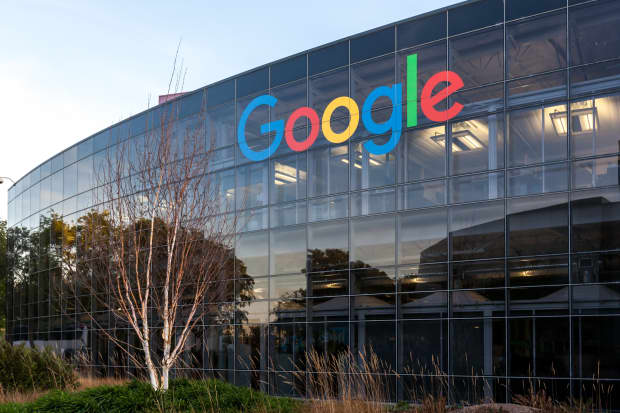The legal team at Google steadfastly swatted away two antitrust lawsuits like pesky flies, mere distractions as the search-engine giant chugs along and accrues record market value despite a pandemic.
Then came suit No. 3.
A bipartisan coalition of 38 attorneys general, spearheaded by Colorado and Nebraska, announced the lawsuit last week, and it goes much farther than its predecessors from the Department of Justice and Texas and nine other states. The most recent suit is broader and more far-reaching than those before it, which narrowly focused on Google’s mobile search and ad-tech market.
Alphabet Inc.’s
GOOGL,
“The claims being made have been closely examined and rejected by regulators and courts around the world, including the U.S. Federal Trade Commission, competition authorities in Brazil, Canada and Taiwan, and courts in the United Kingdom and Germany, who all agreed that our changes are designed to improve your search results,” Adam Cohen, director of economic policy at Google, said in the blog post.
Why such an animated, concerted response — especially after it took Google nearly two months to reply to the original Justice Department filing? Legal experts told MarketWatch the bipartisan suit led by Colorado and Nebraska poses a particular political threat — especially if it is combined with the much narrower Justice case, as Colorado Attorney General Phil Weiser hopes to do.
“A combined case would add heft to the suit,” Vasant Dhar, a professor at NYU Stern School of Business, told MarketWatch. He called such a strategy new to antitrust actions but understandable given the animus toward Big Tech. “Google is in deep trouble.”
The Colorado-Nebraska suit drills down on alleged anticompetitive behavior in Google’s search and search-advertising businesses. It contends Google “uses its massive financial resources to limit the number of consumers who use a Google competitor,” especially in the mobile market, where Google is the default search engine on Android and the company pays Apple Inc.
AAPL,
The suit also claims Google leverages its search-advertising business, SA360, to limit competition by prohibiting interoperability, and the company “throttles” those who attempt an end run around Google to reach sites, products and services directly. Google stymies these so-called “specialized vertical providers” by blocking them from reaching potential customers, especially on mobile, the suit charges.
“As the gateway to the internet, Google has systematically degraded the ability of other companies to access consumers,” Weiser, a Democrat, said during a Zoom
ZM,
As the lawsuits pile up against Google and its search-engine business practices, so do the costs and intellectual headaches associated with a raft of litigation. The explicit Colorado-Nebraska lawsuit, more than previous suits, illustrates “governments catching up to years of activist and academic warnings,” Frank Pasquale, a professor at Brooklyn Law School, told MarketWatch.
“The bipartisan enforcement action of the state attorneys general is arguably more significant than previous lawsuits in that it strikes at the foundation of Google’s dominance: its search results,” contended Luther Lowe, senior vice president of public policy at frequent Google critic Yelp Inc.
YELP,
Added to the legal quagmire is the political calculus of Democrats such as Sens. Elizabeth Warren and Richard Blumenthal advocating the breakup of Google and Facebook Inc.
FB,
Which leads to another set of questions: How does the incoming Biden administration proceed next year with the Justice Department suit? Could a suit consolidating the Colorado-Nebraska filing and Justice cost Google billions of dollars in legal fees over the next few years?
If Google’s reply on Monday to the Justice lawsuit is any indication, expect a long court slog.
“People use Google Search because they choose to, not because they are forced to or because they cannot easily find alternative ways to search for information on the internet,” the company said in a defiant 42-page filing. The company’s denial of the claims was granular, often offering sentence-by-sentence replies to the Justice Department’s filing.
Read more: Google forcefully rebukes U.S. antitrust lawsuit in first legal response
The federal judge hearing the case, Amit Mehta, last week said the trial would not start until 2023.
Given the complexity of the Colorado-Nebraska suit, and the possibility of it being consolidated with Justice’s, the obvious parallel is the Justice Department’s case against Microsoft Corp.
MSFT,
For more: Big Tech was built by the same type of antitrust actions that could now tear it down
“The cases against Google are very different and focus on questionable practices in the digital advertising marketplace, which is very opaque, and there’s strong evidence that Google has been playing the role of the exchange operator as well as a participant — what [Sen. Elizabeth] Warren calls being a referee and having players in the game at the same time,” Dhar said.
“The digital advertising ecosystem has developed while regulators have been somnolent, allowing a Wild West ecosystem to develop where Google gets preferred treatment,” Dhar said.
How the federal and state governments fare in their suits against Google could go a long way toward determining the difficult path of antitrust actions against Big Tech. Facebook, like Google, faces federal and state suits, while Amazon.com Inc.
AMZN,
See also: Big Tech has an antitrust target on its back, and this is where it is headed
Big Tech’s reckoning comes as it continues to accumulate fabulous wealth during the pandemic. The combined market value of Facebook, Apple, Amazon, Tesla Inc.
TSLA,
Still, the legal hurdle in proving consumers were harmed is likely “insurmountable,” Gansler said.
“What is the harm to Google’s customers? The technology is free, but is the consumer sacrificing privacy?” Gansler said. “The data Google collects is used for targeted advertising, which arguably benefits the consumer. There is no direct cost to them, compared with the breakup of AT&T
T,
Adds Dhar: “Using a 19th-century regulatory framework to take actions in the 21st century will be hard to apply. Regulators have been asleep while Big Tech cleaned up [in revenue and market value.]”
CUTS
(The DoJ case focuses almost entirely on Google’s search business, which Justice lawyers allege the company monopolized illegally for more than a decade through “exclusionary agreements and anticompetitive conduct.”)
and presumptive Attorney General Doug Jones — whose most prominent cases were the successful prosecution of two Ku Klux Klan members for the 1963 Birmingham church bombing that killed four African-American girls —





